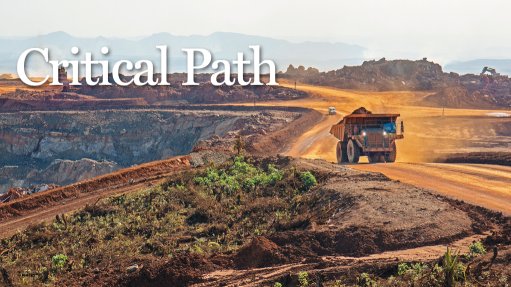On-The-Air (13/09/2019)
Every Friday, SAfm’s radio anchor Sakina Kamwendo speaks to Martin Creamer, publishing editor of Engineering News and Mining Weekly. Reported here is this Friday’s At the Coalface transcript:
Kamwendo: South Africa’s first fuel cell factory is to be built in KwaZulu-Natal by Taiwanese investors.
Creamer: Yes, we have been talking for four or five years about fuel cells on the horizon, but now it is happening. The Taiwanese investor is going to use the Dube Trade port in KwaZulu-Natal and produce fuel cells right here in South Africa. Among their target market is rural areas where you don’t get electricity, because the national electrical grid doesn’t extend that far.
You can put these fuel cells in and get rapid electricity and cleaner electricity for people living in rural areas. At the same time they are a big supplier to the telecoms industry, because you can see these big telecommunication towers often have batteries that are stolen and diesel generators that pollute. They are saying that they can replace those with wonderful fuel cells and it will be clean and reliable and not really tempting to people to come and steal.
Kamwendo: South Africa was this week advised to use up its mountains of discard coal before opening new coal mines.
Creamer: We have this situation in the world now where climate change is a big factor and people are looking at coal when you burn the coal it produces electricity and you create carbon and they are looking to decarbonise. They say that they don’t want to invest in big coal mines now and find that you have got stranded investments, because the technology is changing, people are moving away and you should look at what is already on surface.
That doesn’t mean open cast mines must recall them, but they say that the dumps when you go into Witbank, that there is so much laying around that is legacy that has been mined but has been left on a big dump. Just like we did with the gold mines where we have got the big dumps and they recycled them and got the gold, silver and everything they could out of them and they then recovered the land beneath, which is a big thing.
Now they are saying that before you just go headlong to massive new investment in coal mines consider what is already on surface and try and recover that and get that material if you can into the big power stations and burn that first before you start over investing. Of course, it is easier said then done, because a lot of that slurry is difficult to turn back into reliable material.
Kamwendo: Hydrogen, the most abundant substance on earth, is inching its way towards replacing oil as a universal energy carrier.
Creamer: You look at oil and when did oil come in. Long ago we used to be burning wood and moved along to coal and then petroleum and gas. Now, people are saying go beyond that. We have always dreamed after the First World War when there was a difficulty with oil we dreamed of hydrogen, but there were cost constraints.
It was hard to produce and it was costly to produce and it was also quite safety critical because it could burn. Now, all those technological problems have been removed and the cost has dropped dramatically, because people are now using the sun to create electricity. You use sun provided electricity and put that through water and get very clean hydrogen and you can now transport it as if it was oil. That is how the technology has developed that it becomes an oil-like substance that you transport through the normal rail and ship tankers and put it in your petrol station and recover it.
The cost now has dropped to competitive levels. They are now talking about $1 per litre, which means in South African terms that is about the same as we pay for petrol per litre at the moment. So many people are saying it is about time we got back to hydrogen and stop South Africa from having a huge bill of paying for oil coming in all the time. We can do it ourselves here and have it in our petrol stations.
Kamwendo: Thanks very much. Martin Creamer is publishing editor of Engineering News and Mining Weekly.
Article Enquiry
Email Article
Save Article
Feedback
To advertise email advertising@creamermedia.co.za or click here
Announcements
What's On
Subscribe to improve your user experience...
Option 1 (equivalent of R125 a month):
Receive a weekly copy of Creamer Media's Engineering News & Mining Weekly magazine
(print copy for those in South Africa and e-magazine for those outside of South Africa)
Receive daily email newsletters
Access to full search results
Access archive of magazine back copies
Access to Projects in Progress
Access to ONE Research Report of your choice in PDF format
Option 2 (equivalent of R375 a month):
All benefits from Option 1
PLUS
Access to Creamer Media's Research Channel Africa for ALL Research Reports, in PDF format, on various industrial and mining sectors
including Electricity; Water; Energy Transition; Hydrogen; Roads, Rail and Ports; Coal; Gold; Platinum; Battery Metals; etc.
Already a subscriber?
Forgotten your password?
Receive weekly copy of Creamer Media's Engineering News & Mining Weekly magazine (print copy for those in South Africa and e-magazine for those outside of South Africa)
➕
Recieve daily email newsletters
➕
Access to full search results
➕
Access archive of magazine back copies
➕
Access to Projects in Progress
➕
Access to ONE Research Report of your choice in PDF format
RESEARCH CHANNEL AFRICA
R4500 (equivalent of R375 a month)
SUBSCRIBEAll benefits from Option 1
➕
Access to Creamer Media's Research Channel Africa for ALL Research Reports on various industrial and mining sectors, in PDF format, including on:
Electricity
➕
Water
➕
Energy Transition
➕
Hydrogen
➕
Roads, Rail and Ports
➕
Coal
➕
Gold
➕
Platinum
➕
Battery Metals
➕
etc.
Receive all benefits from Option 1 or Option 2 delivered to numerous people at your company
➕
Multiple User names and Passwords for simultaneous log-ins
➕
Intranet integration access to all in your organisation




















